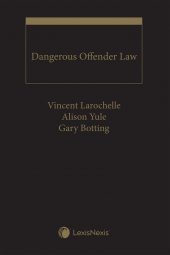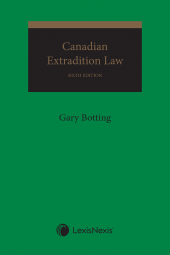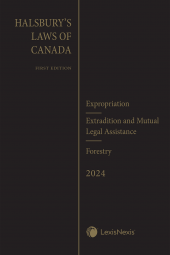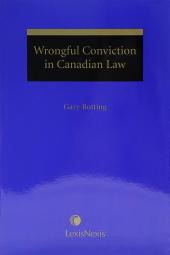Wrongful Conviction in Canadian Law
One Year Subscription Only Terms
Subscribers receive the product(s) listed on the Order Form and any Updates made available during the annual subscription period. Shipping and handling fees are not included in the annual price.
Subscribers are advised of the number of Updates that were made to the particular publication the prior year. The number of Updates may vary due to developments in the law and other publishing issues, but subscribers may use this as a rough estimate of future shipments. Subscribers may call Customer Support at 800-833-9844 for additional information.
Subscribers may cancel this subscription by: calling Customer Support at 800-833-9844; emailing customer.support@lexisnexis.com; or returning the invoice marked 'CANCEL'.
If subscribers cancel within 30 days after the product is ordered or received and return the product at their expense, then they will receive a full credit of the price for the annual subscription.
If subscribers cancel between 31 and 60 days after the invoice date and return the product at their expense, then they will receive a 5/6th credit of the price for the annual subscription. No credit will be given for cancellations more than 60 days after the invoice date. To receive any credit, subscriber must return all product(s) shipped during the year at their expense within the applicable cancellation period listed above.
Détails des produits
Preventing Miscarriages of Justice
Miscarriages of justice in wrongful conviction happen more often than the criminal court system would like to admit. Awareness of the causes can reduce the overall potential for miscarriage of justice. These causes include:
- Prosecutorial "tunnel vision"
- Failure to make full disclosure
- Suborned or concocted evidence
- Eyewitness misidentification
- False confessions
- Reliance on in-custody informers
- Incompetent "experts"
- Flawed legal representation
Wrongful Conviction in Canadian Law is the first book to review and analyze recommendations of Commissions of Inquiry into wrongful convictions. Comparative analyses reveal which recommendations have been implemented as policy, passed into legislation, or endorsed by the courts. You'll learn how the authorities could have made - or could have avoided - such major errors.
Answers to Challenging Questions
- Why are eye-witness accounts the biggest cause of wrongful conviction?
- How does "tunnel vision" affect the various parties in a criminal case?
- How has the testimony of "jailhouse rats" convicted people who were completely innocent?
- How can DNA testing eliminate suspects in cases involving murder, rape and assault?
- What evidence do police need to disclose?
Plus these time-saving features:
- Federal legislation and regulations
- Federal/provincial/territorial recommendations
- Stephen Truscott: The Kaufman Report
- Customizable forms for use in initiating an inquiry under the Criminal Code to determine whether a miscarriage of justice has occurred
A Comprehensive Reference For
- Criminal lawyers who need to effectively and efficiently cross-reference case law to help them prepare compelling arguments to establish innocence
- Criminologists who wish to learn how patterns of wrongful conviction and miscarriages of justice are repeated in criminal courts across Canada
- Academics in law and criminology looking for a textbook that points to whether the inquiry process has been effective and whether the recommendations have been met
- Judicial libraries and prison libraries that need to make information on the possibility of wrongful conviction available to their constituents, as well as the public
- Police, directors of public prosecutions, and Crown prosecutors who need to be aware of when "tunnel vision" takes over and how to avoid it
- Forensic scientists who need to be cautious about conclusions that may lead to wrongful convictions
- Federal minister of justice staff who need a handy text where all wrongful conviction recommendations are cross-referenced
- The Innocence and AIDWYK Projects dedicated to revealing the facts of wrongful conviction in past and current cases
- Coroners seeking to avoid basing conclusions on initial appearances and the early assumptions of police and pathologists
Table des matières
Table of Acronyms and Abbreviations
Table of Cases
Foreword by David Milgaard
Overview
The Recommendations
The Marshall Inquiry (Hickman Commission): Donald Marshall Jr. (Nova Scotia, 1989)
The Morin Inquiry (Kaufman Commission): Guy Paul Morin (Ontario, 1998)
The Sophonow Inquiry (Cory Commission): Thomas Sophonow (Manitoba, 2001)
The Dalton/Parsons/Druken Inquiry (Lamer Commission): Ronald Dalton, Randy Druken and Gregory Parsons (Newfoundland and Labrador, 2006)
The Driskell Inquiry (LeSage Commission): James Driskell (Manitoba, 2007)
The Milgaard Inquiry (MacCallum Commission): David Milgaard (Saskatchewan, 2008)
The Goudge Commission: William Mullins-Johnson, Marco Trotta, et al. Ontario, 2008)
Appendices
Appendix A: Federal Legislation and Regulations
Appendix B: Federal/Provincial/Territorial Recommendations
Appendix C: Stephen Truscott: The Kaufman Report
Appendix D: Forms
Produits liés
-
 Dangerous Offender LawDate de sortie: December 07, 2021165,00 $
Dangerous Offender LawDate de sortie: December 07, 2021165,00 $ -
 Canadian Extradition Law, 6th EditionDate de sortie: October 13, 2023255,00 $
Canadian Extradition Law, 6th EditionDate de sortie: October 13, 2023255,00 $ -
 Halsbury's Laws of Canada – Expropriation (2024 Reissue) / Extradition and Mutual Legal Assistance (2024 Reissue) / Forestry (2024 Reissue)Date de sortie: March 15, 2024335,00 $
Halsbury's Laws of Canada – Expropriation (2024 Reissue) / Extradition and Mutual Legal Assistance (2024 Reissue) / Forestry (2024 Reissue)Date de sortie: March 15, 2024335,00 $
 Lexis Nexis
Lexis Nexis 